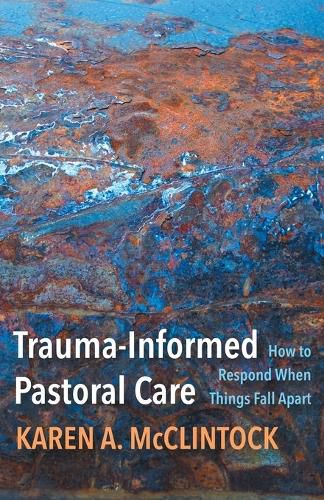Readings Newsletter
Become a Readings Member to make your shopping experience even easier.
Sign in or sign up for free!
You’re not far away from qualifying for FREE standard shipping within Australia
You’ve qualified for FREE standard shipping within Australia
The cart is loading…






Clergy are more likely than ever to be called on to respond to community trauma, sitting alongside trauma survivors after natural disasters, racial violence, and difficult losses. In Trauma-Informed Pastoral Care: How to Respond When Things Fall Apart, pastoral psychologist Karen A. McClintock calls clergy to learn and practice trauma-informed care so they can respond with competence and confidence when life becomes overwhelming.
Weaving together the latest insights about trauma-informed care from the rapidly shifting disciplines of neuropsychology, counseling, and theology, she explains the body’s instinctual stress patterns during and after trauma, guides readers through self-reflection and self-regulation in order to care for others and lower the risk of obtaining secondary trauma, and suggests culturally sensitive models for healing from overwhelming experiences.
McClintock particularly attends to the fact that across a lifetime in ministry, clergy accumulate and need to regularly heal multiple traumatic wounds. As a pastor and psychologist, she is perfectly positioned to help clergy recognize symptoms of trauma and commit to healing individual, community, and generational trauma with care and cultural sensitivity.
$9.00 standard shipping within Australia
FREE standard shipping within Australia for orders over $100.00
Express & International shipping calculated at checkout
Clergy are more likely than ever to be called on to respond to community trauma, sitting alongside trauma survivors after natural disasters, racial violence, and difficult losses. In Trauma-Informed Pastoral Care: How to Respond When Things Fall Apart, pastoral psychologist Karen A. McClintock calls clergy to learn and practice trauma-informed care so they can respond with competence and confidence when life becomes overwhelming.
Weaving together the latest insights about trauma-informed care from the rapidly shifting disciplines of neuropsychology, counseling, and theology, she explains the body’s instinctual stress patterns during and after trauma, guides readers through self-reflection and self-regulation in order to care for others and lower the risk of obtaining secondary trauma, and suggests culturally sensitive models for healing from overwhelming experiences.
McClintock particularly attends to the fact that across a lifetime in ministry, clergy accumulate and need to regularly heal multiple traumatic wounds. As a pastor and psychologist, she is perfectly positioned to help clergy recognize symptoms of trauma and commit to healing individual, community, and generational trauma with care and cultural sensitivity.